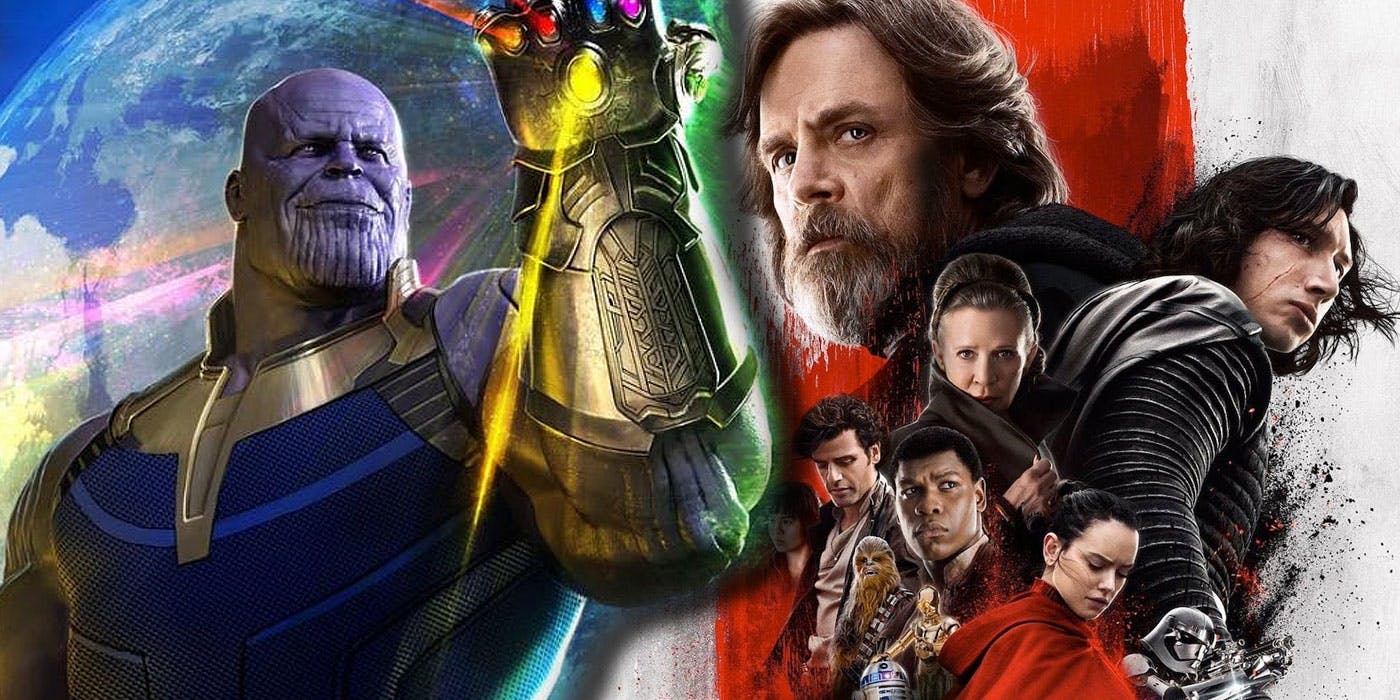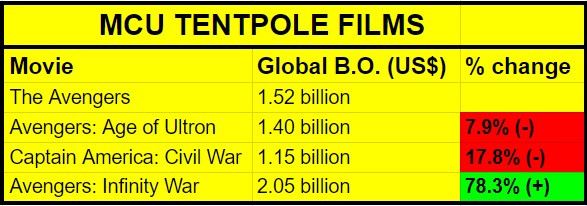While we’re confident that both movies will deliver the goods as far as quality is concerned, one of the biggest question on everybody’s mind is: which one of these movies will do better at the global box office? Below, we breakdown the facts and figures, taking into account their previous box office returns, cultural significance and past receptions.
One film each, in the top 5 of the global box office.
As of right now, both Star Wars and the Marvel Cinematic Universe have a film under their banner that is in the top 5 of the all-time worldwide box office list. After a 10 year hiatus, Star Wars made another comeback in 2015 (this time with a change in management — Disney had purchased Lucasfilm from George Lucas in 2012). The hype surrounding The Force Awakens was unsurprisingly unprecedented. It was perhaps the most anticipated movie of the decade, even more so than The Avengers.
And as proven in the prequel era, Star Wars making a comeback always sells (when The Phantom Menace hit the big screens in 1999, it grossed slightly over $US 1 billion). The Force Awakens hit the big screens during Christmas and completely shattered the global box office, grossing $US 2.07 billion, making it the 3rd highest grossing film of all time globally and the highest grossing film in the US ($US 936 million). On the other end, we have Avengers: Infinity War, occupying 4th place in the global box office rankings, with $US 2.05 billion, merely a slither lower than The Force Awakens. An interesting difference that can be derived is that The Force Awakens was a ‘comeback film’ — the first chapter of a new trilogy/7th chapter of the overall saga — Infinity War, on the other hand, was the first part of the ‘final chapter’.
What do the track records say?
Many have argued that The Last Jedi’s box office decline is a sign of Star Wars’ dropping popularity, no thanks to Rian Johnson’s so-called butchery of the product (note that this writer is a huge fan of The Last Jedi). TLJ grossed over $US 1.3 billion at the global box office, which is a 37% decline from its record-breaking predecessor, The Force Awakens. But is that really because of Rian Johnson’s polarising film, though? Let’s take a look at Star Wars’ trend throughout the ages.
A quick glance at the table above shows us that as far as Star Wars is concerned, the second instalment always takes an exponential dive, regardless of quality. After all, isn’t The Empire Strikes Back widely considered to be the greatest Star Wars movie ever made? The table also shows us that the third instalment is anybody’s guess. Return of the Jedi made even less than The Empire Strikes Back while Revenge of the Sith made $US 200 million more than its predecessor. Episode IX could swing either way too. On a separate note, The Last Jedi‘s US$ 700 million dive from The Force Awakens means even less when you consider the surreal hype surrounding the first Star Wars movie of the Disney era. The Force Awakens came out 10 years after Revenge of the Sith; The Last Jedi, on the other hand, came out merely two years after TFA, and let’s not forget Rogue One that was released in between the two. As they say, distance makes the heart grow fonder.
Even the Marvel Cinematic Universe isn’t safe from box office-sequelitis. Let’s look at their tentpole films.
The notion that Marvel, unlike Star Wars has never lost their groove is completely false. The second Avengers movie, Avengers: Age of Ultron made less than its predecessor, while Captain America: Civil War which had almost all the characters from the Marvel Cinematic Universe come together for the first time, made even less (though, we can say that’s more than likely because of the lack of “Avengers” branding) — a trend that mirrors that of the Star Wars franchise. As far as spinoffs/solo outings are concerned, Rogue One which grossed over $US 1.06 billion at the global box office is ahead of every single non-tentpole Marvel movie except Iron Man 3 ($US 1.2 billion) and Black Panther ($US 1.3 billion). The same, however, can’t be said about Solo: A Star Wars Story, which was released during the summer, instead of Christmas. The Han Solo spinoff turned out to be a huge box office failure, grossing merely $US 393 million and currently ranks 288 at the worldwide box office.
Additional aspects to consider
Episode IX will be hitting the big screens in December. And considering the last Star Wars movie came out in May 2018, there might be a longing among fans for a new Star Wars movie. Black Panther, on the other hand, is now a Best Picture Oscar-nominated film. This could add some “prestige” to the MCU brand and possibly attract new audiences — the kind that usually avoids comic book movies — to catch Endgame. People are still arguing over The Last Jedi, and while that can be seen as a big plus point when it comes to the overall legacy of Star Wars (after all, great art is quite often polarising), it may put a dent in Episode IX’s box office, especially if a chunk of the fan group, who hated The Last Jedi chooses to “boycott” the film. However, J.J. Abrams, the director of The Force Awakens has returned to the helm of Episode IX. That could very much be a pulling factor. On the other side of the squared circle, Infinity War is universally loved by critics, fans and casual audiences alike.
Prediction and final thoughts.
After rereading the previous thousand words, I’m leaning towards Infinity War winning the proverbial box office battle. There is little doubt in my mind that StarWars: Episode IX will see at least a 30% rise in box office gross from The Last Jedi, raking in around $US 1.7 billion. However, Avengers: Endgame has all the momentum in the world going for it. Mix that with the fact that “part 2s” almost always do better than “part 1s” — Harry Potter and the Deathly Hallows ($US 960 million vs $US 1.3 billion), Twilight: Breaking Dawn ($US 712 million vs $US 829 million) — the Marvel Cinematic Universe is heading towards another record-breaking run with Endgame. Source: Box Office Mojo



